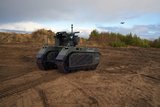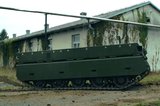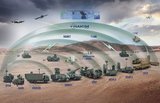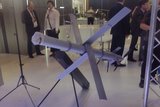BAE rethinks suspension systems
BAE Systems is working on a new type of bendable titanium alloy suspension system that will allow suspension systems to ‘bounce back’ into shape following explosive impacts on future military vehicles.
The current approach to protecting vehicles against IED strikes focuses on protecting the vehicle hull to protect passengers. With the suspension left vulnerable, damaged vehicles must be rescued by other another military unit.
Initial tests on a prototype that allows the flexible ‘memory alloy’ suspension to recover after a blast so that the vehicle can continue its mission have proved successful, and BAE Systems believes that it could be made available within a decade.
Using the memory metal - first developed by the US Naval Ordnance Laboratory in the 1960s – also enables the spring to be removed from the suspension.
Marcus Potter, head of mobility at BAE Systems Land UK, said: ‘This unique use of memory metals could prove a real game-changer for combat vehicles taking part in operations. Being able to adapt to changing situations is hugely important to maintaining effectiveness, and this application of bendable titanium could give armed forces the required flexibility – and survivability – to complete tasks in challenging areas.’
More from Land Warfare
-
![World Defense Show 2026: DOK-ING working on MV-8 variants and reveals specs ahead of Eurosatory]()
World Defense Show 2026: DOK-ING working on MV-8 variants and reveals specs ahead of Eurosatory
The Croatian company began the development of the MV-8 modular uncrewed platform in the early 2020s. Specifications for the vehicle were revealed to Shephard at World Defense Show 2026.
-
![World Defense Show 2026: Turkish and European industries will cooperate, says Aselsan boss]()
World Defense Show 2026: Turkish and European industries will cooperate, says Aselsan boss
Aselsan was formed 50 years ago in response to difficulties Turkey was facing in sourcing major systems internationally. While some challenges still remain, company president Ahmet Akyol believes a rapprochement is possible.
-
![World Defense Show 2026: Russia reveals details of new loitering munition]()
World Defense Show 2026: Russia reveals details of new loitering munition
The Kalashnikov RUS-PE cannister-launched man-portable loitering munition was displayed as a model at World Defense Show 2026 with a company official telling Shephard it was “in service and in low-rate initial production”.
-
![World Defense Show 2026: MARSS displays new Nation Shield air defence C2 system]()
World Defense Show 2026: MARSS displays new Nation Shield air defence C2 system
Nation Shield is the latest iteration of the MARSS C2 system and is designed to provide C2 further forward along with more capable air defence.























